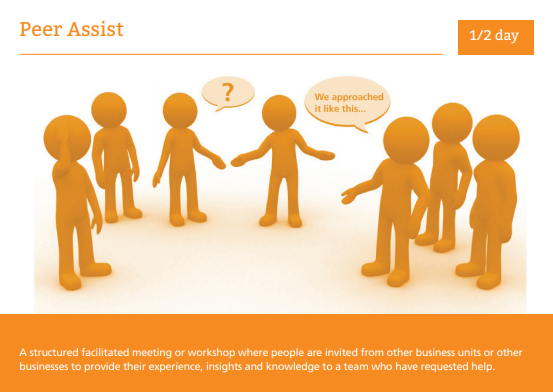 A peer assist is a knowledge management tool where peers (perhaps four or five people) from another team are invited to share insights, experience and knowledge at a facilitated meeting.
A peer assist is a knowledge management tool where peers (perhaps four or five people) from another team are invited to share insights, experience and knowledge at a facilitated meeting.
This might be to support a team that are looking to embark on a project or service change, or that have a specific problem or challenge, and want to know what worked (or what didn't) from another team that has similar experience. A peer assist can bring knowledge and experience to the point of need.
Peer assists allow people to learn from other people's experiences and knowledge, establish an open culture of learning, support networking, and stimulate new perspectives. They are part of the process of 'learning before doing' and are about gathering knowledge before embarking on an activity or project, or when facing a difficulty in the course of related events.
The home team asking for the peer assist needs to have clear objectives of what they want to gain from the meeting. Peers can come from within the organisation, or outside it, but are people with experience of the issue.
How do they work?
- A facilitator is appointed, and lots of notice given. Background information is circulated to the home team and the visiting peers
- Allow some time for socialising before the meeting, to build some rapport between the home team and the visitors
- At the meeting, the home team presents the context and any plans, issues and opportunities, and say what they'd like to get out of the meeting
- The visiting peers ask questions, and provide feedback on what worked (or what didn't) for them, and provide recommendations, options or guidance
- The home team reflects on what's been said, and examines options
- The visitors provide feedback, answer questions, and suggests some actions for the home team
Meeting can be face-to-face or virtual, and the time can be anything from 1.5 hours to half a day (or even longer if necessary!). Flipcharts are ideal for face-to-face meetings, but someone on the home team should take detailed notes as well.
It's important to remember that as well learning from experience, the evidence base needs to be taken into consideration as well when making decisions. Library staff are able to conduct evidence searches to support decision-making, or find case studies or what worked elsewhere.
Peer assists are not peer reviews - the visiting team are not coming to critique the home team, but to transfer knowledge.
Further reading
![]() Want to know how to make better use of evidence and organisational knowledge in your work? Have a look at our latest newsletter called 'The Knowledge' that looks at knowledge mobilisation.
Want to know how to make better use of evidence and organisational knowledge in your work? Have a look at our latest newsletter called 'The Knowledge' that looks at knowledge mobilisation.
